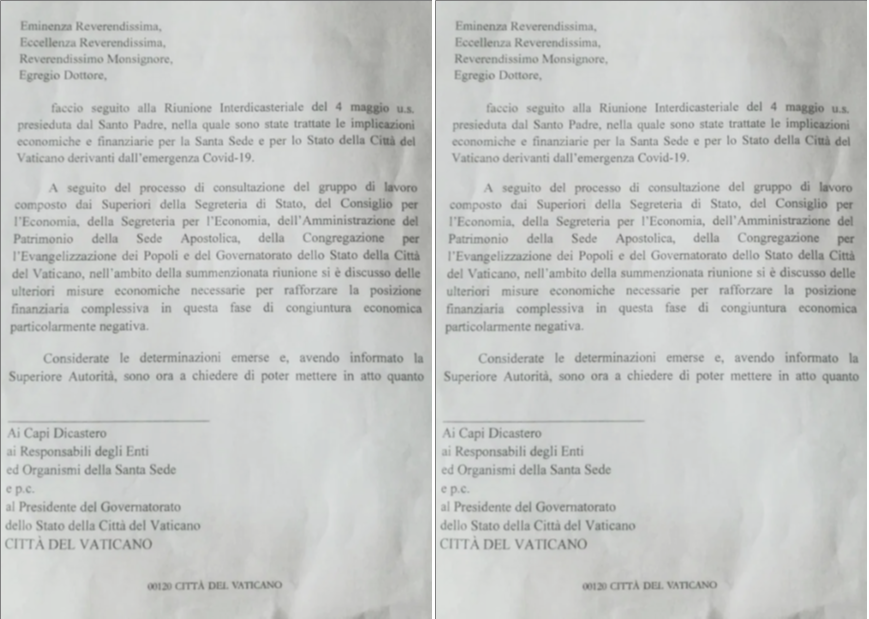 Great example of the Bergoglian song-and-dance over Vatican 'financial' reform - two or maybe even more steps back after the 'one step forward'
Great example of the Bergoglian song-and-dance over Vatican 'financial' reform - two or maybe even more steps back after the 'one step forward'
that John Allen was touting recently...
VATICAN IN CRISIS
All offices, agencies ordered
to shut down all external accounts
and deposit all funds only at APSA
Translated by Giuseppe Pellegrino from

July 7, 2020
Dear friends and enemies of Stilum Curiae, we have received a letter which the Prefect of the Secretariat of the Economy and Finance, Juan A. Guerrero, S.J., sent to the heads of all Vatican departments, essentially to ask that they close all current “external” accounts of the various dicasteries and offices and transfer the money preserved in these accounts to APSA, the Administration of the Patrimony of the Holy See.
APSA is, of course, currently headed by the former secretary of the Italian Bishops’ Conference, Bishop Nunzio Galantino, and by Bishop Gustavo Zanchetta, the bishop protected by Bergoglio who is under investigation in Argentina for alleged sexual abuse of seminarians and criticized for his financial management of the Diocese of Orano, from which he suddenly fled, only to reappear at Santa Marta under the pope's preferential patronage.
Here is the letter:
SECRETARIAT FOR THE ECONOMY
To the Dicastery Heads
To the Heads of Entities and Organs of the Holy See
To the President of the Governorate of the Vatican City State
From the Vatican, 8 May 2020
Most Reverend Eminence,
Most Reverend Excellency,
Most Reverend Monsignor,
Egregious Doctor,
I write this following the Inter-Dicasterial Meeting of 4 May presided over by the Holy Father, which addressed the economic and financial implications for the Holy See and Vatican City State deriving from the Covid-19 emergency.
Following the process of consultation of the working group composed of the Superiors of Secretariat of State, the Council for the Economy, the Secretariat for the Economy, the Administration of the Patrimony of the Holy See, the Congregation for the Evangelization of Peoples and the Governorate of the Vatican City State, in the context of the aforementioned meeting, further economic measures were discussed in order to strengthen the overall financial position at this particularly negative economic juncture.
Having considered determinations that emerged, and having informed the Superior Authority, I am now asking to be able to implement what has been established regarding the liquidity management of each Entity. More particularly, I am kindly requesting the following:
- Keep the funds held at APSA, avoiding moving them to other financial institutions, except for funds aimed at and tied to specific activities, projects, or donations.
- Transfer to APSA any liquidity presently in current accounts with external financial institutions.
-Transer to APSA any liquidity in current accounts at IOR.
Where it is necessary to maintain a deposit with IOR or other banks for operational needs, I am kindly asking you to communicate this to this Secretariat as soon as possible.
The Secretariat for the Economy remains at your disposition for any necessary clarification. Thanking you for your attention to this matter, and taking this occasion to offer you my kindest regards.
Juan A. Guerrero, S.J.
Prefect
According to several experts in Vatican finances whom we have consulted, the motive of this letter – which does not seem to have been received with big smiles by the heads of the different Dicasteries – indicates one thing above all else: that the Holy See has a desperate need for liquidity, and since it is APSA that pays all the salaries of Vatican employees, the need for funds is mandatory.
Among other things, it has been noted that many organs of the Holy See have accounts in banks other than APSA and IOR (the Institute for Religious Works – from whose account, however, they tell us, you cannot make transfers), which are necessary for example for organs like the Vatican Publishing House (LEV) that are concerned with publications.
“They are looking between the cushions of the sofa and the armchairs to find the money that has fallen out of their pockets,” joked one of the experts whom we consulted.
Certainly the closure of the Vatican Museums [in February due to the Covid crisis] and their as yet only partial reopening (there are no rivers of tourists as in the past) was a harsh blow to the revenue normally generated by the ticket office, and thus to the liquidity of the Holy See.
But in addition to the hypothesis of a huge liquidity crisis at APSA, there is also that of a much broader strategic project (and that does not exclude the first reason at all).
One of the experts we consulted hypothesizes that they are thinking of closing the IOR and making APSA the only financial institution of the Holy See, a hypothesis already aired about ten years ago.
If all the entities and institutions of the Holy See remove their funds deposited at IOR and transfer them to APSA, the only thing remaining in the IOR would probably be “unofficial accounts.”
This could signify the desire to put what is transparent into APSA and leave the rest to IOR.
In technical terms, this would mean distinguishing and implementing the “Bad Bank” from the “Good Bank” – the Holy See would hold the “Good Bank”(APSA), and the “Bad Bank”(IOR) could be sold, for example, to a Swiss or Luxembourgian bank.
[Modificato da TERESA BENEDETTA 09/07/2020 22:48]